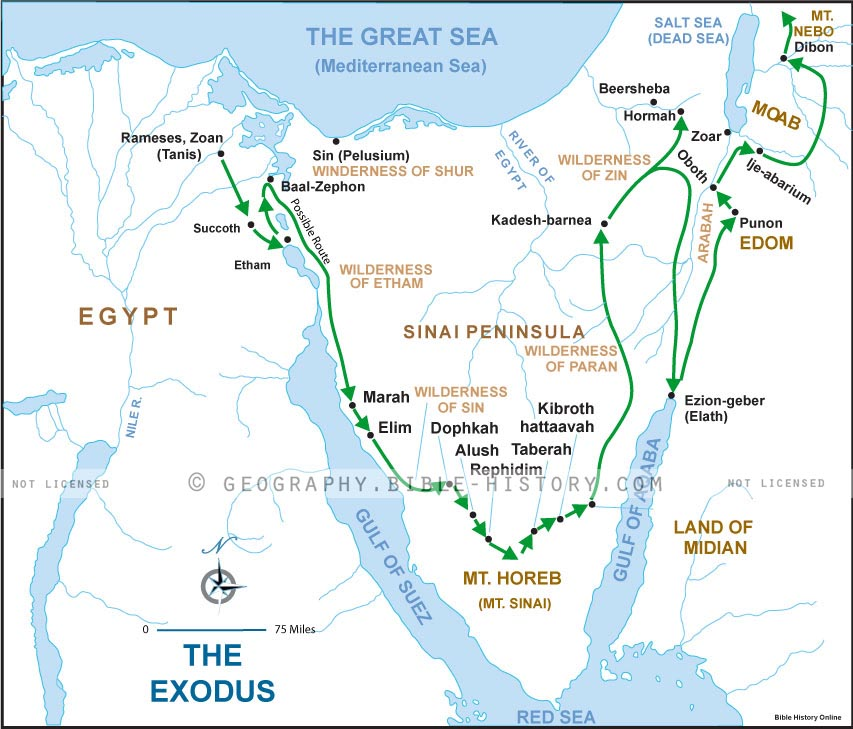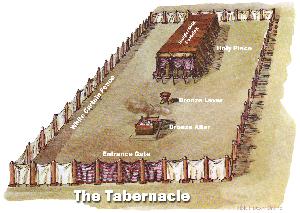Leviticus 10:1 And Nadab and Abihu, the sons of Aaron, took either of them his censer, and put fire therein, and put incense thereon, and offered strange fire before the LORD, which he commanded them not. - Free Bible Online
Leviticus 10:1 Now Nadab and Abihu, the sons of Aaron, took their respective firepans, and after putting fire in them, placed incense on it and offered strange fire before the LORD, which He had not commanded them.
Le 10:1-20. NADAB AND ABIHU BURNT.
1. the sons of Aaron, &c.--If this incident occurred at the solemn period of the consecrating and dedicating the altar, these young men assumed an office which had been committed to Moses; or if it were some time after, it was an encroachment on duties which devolved on their father alone as the high priest. But the offense was of a far more aggravated nature than such a mere informality would imply. It consisted not only in their venturing unauthorized to perform the incense service--the highest and most solemn of the priestly offices--not only in their engaging together in a work which was the duty only of one, but in their presuming to intrude into the holy of holies, to which access was denied to all but the high priest alone. In this respect, "they offered strange fire before the Lord"; they were guilty of a presumptuous and unwarranted intrusion into a sacred office which did not belong to them. But their offense was more aggravated still; for instead of taking the fire which was put into their censers from the brazen altar, they seem to have been content with common fire and thus perpetrated an act which, considering the descent of the miraculous fire they had so recently witnessed and the solemn obligation under which they were laid to make use of that which was specially appropriated to the service of the altars, they betrayed a carelessness, an irreverence, a want of faith, most surprising and lamentable. A precedent of such evil tendency was dangerous, and it was imperatively necessary, therefore, as well for the priests themselves as for the sacred things, that a marked expression of the divine displeasure should be given for doing that which "God commanded them not."
JFB.
Questions Related to this Verse
Where in Scripture does it mention The death of Abihu?Select a Chapter
-
Leviticus 1 |
Leviticus 2 |
Leviticus 3 |
Leviticus 4 |
Leviticus 5 |
Leviticus 6 |
Leviticus 7 |
Leviticus 8 |
Leviticus 9 |
Leviticus 10 |
Leviticus 11 |
Leviticus 12 |
Leviticus 13 |
Leviticus 14 |
Leviticus 15 |
Leviticus 16 |
Leviticus 17 |
Leviticus 18 |
Leviticus 19 |
Leviticus 20 |
Leviticus 21 |
Leviticus 22 |
Leviticus 23 |
Leviticus 24 |
Leviticus 25 |
Leviticus 26 |
Leviticus 27 |
Select a Book of the Bible
-
Genesis |
Exodus |
Leviticus |
Numbers |
Deuteronomy |
Joshua |
Judges |
Ruth |
1 Samuel |
2 Samuel |
1 Kings |
2 Kings |
1 Chronicles |
2 Chronicles |
Ezra |
Nehemiah |
Esther |
Job |
Psalms |
Proverbs |
Ecclesiastes |
Song of Solomon |
Isaiah |
Jeremiah |
Lamentations |
Ezekiel |
Daniel |
Hosea |
Joel |
Amos |
Obadiah |
Jonah |
Micah |
Nahum |
Habakkuk |
Zephaniah |
Haggai |
Zechariah |
Malachi |
Matthew |
Mark |
Luke |
John |
Acts |
Romans |
1 Corinthians |
2 Corinthians |
Galatians |
Ephesians |
Philippians |
Colossians |
1 Thessalonians |
2 Thessalonians |
1 Timothy |
2 Timothy |
Titus |
Philemon |
Hebrews |
James |
1 Peter |
2 Peter |
1 John |
2 John |
3 John |
Jude |
Revelation |
The Book of Leviticus
Leviticus 16:30 - For on that day shall the priest make an atonement for you, to cleanse you, that ye may be clean from all your sins before the LORD.
The Old Testament - A Brief Overview
Summary of The Book of LeviticusBible Survery - Leviticus
Hebrew Name - Vayyiqra "and He called"
Greek Name - Leviticus "from Levi"
Author - Moses
Date - 1490 BC Approximately
Theme - God's Laws for the Hebrew Nation
Types and Shadows - In Leviticus Jesus is the High Priest
In the Septuagint (The Greek translation of the Hebrew Old Testament), the third book of the Pentateuch is called "Levitikon" ("pertaining to the Levites"), which is an adjective that modifies the word "book." The Levites were the tribe in Israel from which the priests and others prominent in the worship services were chosen, in place of the firstborn sons of all the tribes (Num. 3:45). Leviticus plays a very important and essential role in the Pentateuch. In the same way that it is important to understand the book of Exodus before reading Leviticus, it seems just as important to read the book of Leviticus before reading the books of Numbers and Deuteronomy and the rest of the Old Testament for that matter. The purpose of the book of Leviticus is to make a clear focus on the holiness of God, and a clear distinction on the sinfulness of man in the light of God's holiness. God provides the necessary steps that man needs to take to restore the great fellowship which was lost between God and man as a result of the terrible defilement of sin. God explains the laws that make this restoration possible, in a general sense and also a very specific sense. These laws are intended to govern the whole life of the people chosen to serve God. Because of the focus on God's holiness and how to approach Him the book of Leviticus is clearly the most legalistic book in the entire Old Testament. The core message of God's laws is seen in the absolute statement "Ye shall be holy, for I the Lord your God am holy." Yet the great climax of this book can be clearly seen in Leviticus 16 where God gives the instructions for making atonement for sin on the Great Day of Atonement (Yom Kippur). When the high priest entered into the holy of holies and sprinkled the blood upon the Mercy Seat the sins of the entire nation for the previous year were forgiven by God. The mercy which God showed forth on the day of atonement so foreshadows the work of Christ that the Leviticus 16 has been called "the most beautiful flower of all Messianic symbolism."
In addition to the moral, ceremonial, and civil laws set forth in the book of Leviticus, there are also some historical sections, but these too are centered around the priesthood. These historical portions include the consecration of the priests in Leviticus 8 and 9, the sin and punishment of Nadab and Abihu (Leviticus 10), and the stoning of the blasphemer (Leviticus 24:10 ff). it is interesting that the Levites are not mentioned except one time very briefly and incidental (Leviticus 25:32 ff).
ILLUSTRATIONThe Tabernacle of Moses
The ancient Tabernacle of Moses illustration with the curtain fence, the bronze laver, the bronze altar, the holy place, and the badger skin covering. (Click to Enlarge)
The book may be divided as follows :
Outline of the Book of Leviticus
1 ) Laws concerning Sacrifice (1-7). In this section five types of offerings are discussed: burnt offerings, meal offerings, peace offerings, sin offerings and guilt offerings. This is filled out by a discussion of the sin offering as it is to be observed by various classes of individuals.
2 ) An historical section featuring the consecration of the priests (8-9) and the sin of Nadab and Abihu (ch. 10).
3 ) A section on laws of purification from ceremonial uncleanness (11-15). These furnish instructions as to the appropriate sacrifices and ordinances for ridding oneself of impurity.
4) The Day of Atonement (ch. 16).
5 ) Laws dealing with the conduct of God's people (17-20). These include various religious and ethical laws designed to accent the separation between Israel and the heathen nations.
6) Laws concerning the holiness of the priests (21-22).
7 ) A discussion of holy days and feasts (23-24). Included in this section are the Sabbath, Passover, the feasts of first fruits and harvest, Pentecost, the Day of Atonement and the feast of Tabernacles.
8 ) The Sabbatical and Jubilee Years (ch. 25).
9 ) Promises and threats connected with obedience to the laws (ch. 26).
10) An appendix containing the laws concerning vows (ch. 27).
Quick Reference Map

Map of the Possible Route of the Exodus
(Click to Enlarge)
Quick Reference Maps - Leviticus
Israel During the Book of Exodus
The World During the Book of Exodus
The Exodus of the Hebrews From Egypt
The Red Sea at the Time of Moses
Leviticus Resources
The Giving of the Law
The
Tabernacle
More About the Book of Leviticus
Leviticus
in the Picture Study Bible
The Old Testament
Timeline of the Ancient
World
Back to Bible
History Online
Bibliography Information
Free Bible Online Picture Study Bible, King James Version. New York: American Bible Society: www.free-bible.com, 1995-2013. Bible History Picture Study Bible. Jan 09, 2026.
- King James Bible Home
- Free Bible Home Page
- Bible Encyclopedia (ISBE)
- Online Bible (KJV)
- Naves Topical Bible
- Smith's Bible Dictionary
- Easton's Bible Dictionary
- Fausset's Bible Dictionary
- Matthew Henry Bible Commentary
- Hitchcock's Bible Dictionary
Read The Bible
- 1599 Geneva Bible (GNV)
- 21st Century King James Version (KJ21)
- American Standard Version (ASV)
- Amplified Bible (AMP)
- Amplified Bible, Classic Edition (AMPC)
- Authorized (King James) Version (AKJV)
- BRG Bible (BRG)
- Christian Standard Bible (CSB)
- Common English Bible (CEB)
- Complete Jewish Bible (CJB)
- Contemporary English Version (CEV)
- Darby Translation (DARBY)
- Disciples’ Literal New Testament (DLNT)
- Douay-Rheims 1899 American Edition (DRA)
- Easy-to-Read Version (ERV)
- English Standard Version (ESV)
- English Standard Version Anglicised (ESVUK)
- Evangelical Heritage Version (EHV)
- Expanded Bible (EXB)
- GOD’S WORD Translation (GW)
- Good News Translation (GNT)
- Holman Christian Standard Bible (HCSB)
- International Children’s Bible (ICB)
- International Standard Version (ISV)
- J.B. Phillips New Testament (PHILLIPS)
- Jubilee Bible 2000 (JUB)
- King James Version (KJV)
- Lexham English Bible (LEB)
- Living Bible (TLB)
- Modern English Version (MEV)
- Mounce Reverse Interlinear New Testament (MOUNCE)
- Names of God Bible (NOG)
- New American Bible (Revised Edition) (NABRE)
- New American Standard Bible (NASB)
- New American Standard Bible 1995 (NASB1995)
- New Catholic Bible (NCB)
- New Century Version (NCV)
- New English Translation (NET)
- New International Reader's Version (NIRV)
- New International Version - UK (NIVUK)
- New International Version (NIV)
- New King James Version (NKJV)
- New Life Version (NLV)
- New Living Translation (NLT)
- New Matthew Bible (NMB)
- New Revised Standard Version (NRSV)
- New Revised Standard Version Catholic Edition (NRSVCE)
- New Revised Standard Version, Anglicised (NRSVA)
- New Revised Standard Version, Anglicised Catholic Edition (NRSVACE)
- New Testament for Everyone (NTE)
- Orthodox Jewish Bible (OJB)
- Revised Geneva Translation (RGT)
- Revised Standard Version (RSV)
- Revised Standard Version Catholic Edition (RSVCE)
- The Message (MSG)
- The Voice (VOICE)
- Tree of Life Version (TLV)
- World English Bible (WEB)
- Worldwide English (New Testament) (WE)
- Wycliffe Bible (WYC)
- Young's Literal Translation (YLT)
Table of Contents
Main Menu
- Ancient Assyrian Social Structure
- Ancient Babylonia
- Ancient Canaan During the Time of Joshua
- Ancient History Timeline
- Ancient Oil Lamps
- Antonia Fortress
- Archaeology of Ancient Assyria
- Assyria and Bible Prophecy
- Augustus Caesar
- Background Bible Study
- Bible
- Biblical Geography
- Fallen Empires - Archaeological Discoveries and the Bible
- First Century Jerusalem
- Glossary of Latin Words
- Herod Agrippa I
- Herod Antipas
- Herod the Great
- Herod's Temple
- High Priest's in New Testament Times
- Jewish Literature in New Testament Times
- Library collection
- Map of David's Kingdom
- Map of the Divided Kingdom - Israel and Judah
- Map of the Ministry of Jesus
- Matthew Henry Bible Commentary
- Messianic Prophecy
- Nero Caesar Emperor
- Online Bible Maps
- Paul's First Missionary Journey
- Paul's Second Missionary Journey
- Paul's Third Missionary Journey
- Pontius Pilate
- Questions About the Ancient World
- Tabernacle of Ancient Israel
- Tax Collectors in New Testament Times
- The Babylonian Captivity
- The Black Obelisk of Shalmaneser
- The Books of the New Testament
- The Court of the Gentiles
- The Court of the Women in the Temple
- The Destruction of Israel
- The Fall of Judah with Map
- The History Of Rome
- The Incredible Bible
- The Jewish Calendar in Ancient Hebrew History
- The Life of Jesus in Chronological Order
- The Life of Jesus in Harmony
- The Names of God
- The New Testament
- The Old Testament
- The Passion of the Christ
- The Pharisees
- The Sacred Year of Israel in New Testament Times
- The Samaritans
- The Scribes
Ancient Questions
- Why Do the Huldah Gates Appear Different in Ancient Replicas and Modern Photos?
- What Is the Origin of the Japanese and Chinese Peoples? A Biblical Perspective
- How did the ancient Greeks and Romans practice medicine and treat illnesses?
- What were the major contributions of ancient Babylon to mathematics and astronomy?
- How did the ancient Persians create and administer their vast empire?
- What were the cultural and artistic achievements of ancient India, particularly during the Gupta Empire?
- How did ancient civilizations like the Incas and Aztecs build their remarkable cities and structures?
- What were the major trade routes and trading practices of the ancient world?
- What was the role of slavery in ancient societies like Rome and Greece?
- How did the ancient Mayans develop their sophisticated calendar system?
Bible Study Questions
- Why Do Christians Celebrate Christmas?
- How Many Chapters Are There in the Bible?
- The Five Key Visions in the New Testament
- The 400-Year Prophecy: Unpacking Genesis 15 and the Journey of a People
- The Authorized (King James) Version (AKJV): Historical Significance, Translation Methodology, and Lasting Impact
- Exploring the English Standard Version (ESV): Its Aspects, Comparisons, Impact on Biblical Studies, and Church Use
- A Detailed Historical Analysis of Language Updates in the KJ21: Comparison with Other Versions
- A Detailed Historical Analysis of the American Standard Version (ASV): Comparison to the King James Version, Influence on Later Translations, and Evaluation of Strengths and Weaknesses
- A Detailed Historical Analysis of Amplifications in the Amplified Bible (AMP) and Its Comparison to Other Bible Translations
- Detailed Historical Analysis of the Amplified Bible Classic Edition (AMPC): Examples of Amplifications and Comparative Analysis with Other Bible Translations
About
Welcome to Free Bible: Unearthing the Past, Illuminating the Present! Step into a world where ancient history and biblical narratives intertwine, inviting you to explore the rich tapestry of human civilization.
Discover the captivating stories of forgotten empires, delve into the customs and cultures of our ancestors, and witness the remarkable findings unearthed by dedicated archaeologists.
Immerse yourself in a treasure trove of knowledge, where the past comes alive and illuminates our understanding of the present.
Join us on this extraordinary journey through time, where curiosity is rewarded and ancient mysteries await your exploration.
Recent posts
-

Best Paphos property developers (and how to choose the right one)
Buying property in Paphos is one of the most popular real-estate decisions in Cyprus, whether the goal is relocation, lifestyle living, or long-term i... -

CQR Pants vs 5.11 Tactical: My Honest Review After Hiking the Jesus Trail and Via Dolorosa
After walking 65 kilometers through the Galilee hills and navigating Jerusalem's ancient stone streets, I can tell you exactly which tactical pants su... -

Finding the right services for immigrants in the United States
As we understand, life for immigrants in the United States can be challenging, especially in the early stages. Once you have solved the most important... -

Onigiri packaging for retailers and cafés
Onigiri packaging for retailers and cafés plays a crucial role in preserving freshness, ensuring food safety, and enhancing product presentation. As ... -

How to Choose the Perfect Christian Living Community
Did you know that two-thirds of Americans identify as Christians and more than half of those attend religious services more than once a month? When se...


